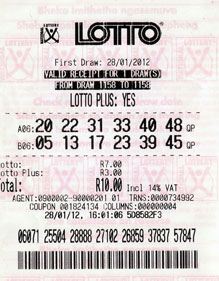
It was established in 1997 and claims a budget of R2-billion per annum for community development initiatives across the country in areas like arts and sports, while also funding charities. But how does the National Lotteries Board ensure that every appeal for funding is legitimate and that the money will be used for a deserving cause?
CEO Charlotte Mampane says her organisation has fallen victim to fraudsters in the past and the system is not 100% risk-free, but things are looking up and between the modernisation of the NLB’s systems and the introduction of more inclusive legislation, quality assurance will soon be a guaranteed term of service.
Funds that go to grant beneficiaries are distributed through the National Lottery Distribution Trust Fund (NLDTF), while the board’s functions include vetting of prospective grantees, verification processes that determine their eligibility for the funds and the actual paying out of these funds to the correct recipients.
The lotteries board is not without its challenges. Since Corruption Watch’s launch two and a half years ago, we have received over 20 reports from members of the public implicating grant recipients in allegations of fraud and abuse of funds. Although the projects mentioned differ in nature, the methods used by those submitting fraudulent applications are often similar. The applicant uses the name of an existing charity to solicit funding or makes up a new charity and doctors financial documents of an existing organisation to make it seem like their own.
From start to finish, there are many risk factors to consider, says Mampane, but with the board’s mission to modernise systems for better and quicker fact-checking methods, it hopes to save more money in the future.
The NLB also has a new CIO, Mothibi Ramusi, who leads a team of IT specialists charged with ensuring better quality vetting and payment systems. “We need to make sure that proposals [for funding] are safe and when payments are made they are made to the right person.”
Ramusi added that his team will also ensure that the NLB has a stable ICT infrastructure. “The feedback I have received is that people want a smarter NLB, and that is what I will be working on.”
According to Mampane, the NLB saved about R250-million in the past year by circumventing fraudulent applications. “This was the value of about 13 projects that we withdrew from. It has not been an easy process,” she said. “We are just thankful that these got intercepted before any monies had been paid.”
The NLB does not have the powers to prosecute would-be fraudsters who abuse its systems, and thus hands cases over to the South African Police Service (SAPS). “We have never had definitive cases of fraud involving employees,” Mampane explained when asked by Corruption Watch about cases involving possible collusion between NLB staff and applicants.
The SAPS is currently in possession of 24 cases of possible fraud handed to them by the board.
Broad mandate
Besides the function of inviting and processing grant applications, the NLB also has the responsibility of ensuring that the licensed lottery operator – the only one in the country – is fully operational and meeting its targets. The current licensee is Gidani, whose five-year term ends this year. The appointment of the new operator, said Mampane, will be announced in 2015.
“We engage the regulator [Gidani] once a month, to monitor performance just to make sure that they deliver and because we have made the commitment to South Africans that we will distribute the money to causes.”
The NLB accounts to the Department of Trade and Industry (DTI), which is in turn accountable for the board’s performance through oversight processes in Parliament. A new set of regulations governing the running of the board’s operations will come into effect before the end of the year.
“The amended legislation will create an opportunity for the NLB team to go out and conduct research and come back to present [on] projects to the distributing agents and make sure we fund those people,” said Mampane.
“In most instances, those people who want to access our funding are not people who have had exposure in terms of how to apply for funding.”
Requirements of the application process, she added, include the submission of annual financial statements, and these further require auditing.
Panels of five to seven members each adjudicate applications for initiatives in the arts, sports and charities sectors. Until recently, explained Mampane, the adjudicators were contracted on a temporary basis, which created a bottleneck effect on the approval process because they were few and had little time. “The amended legislation allows the board to now absorb adjudicators into the NLB structure, which means they will now have more time.” Adjudicators are appointed by the DTI.
Ramusi hopes for a platform in the future where content generation becomes part of what the NLB does. This, he says, will mean that the organisation will be able to showcase its work to parts of South Africa that are not aware of the NLDTF’s work, and even in other countries.

